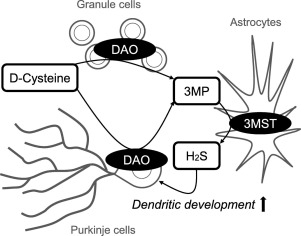Molecular and Cellular Neuroscience ( IF 3.5 ) Pub Date : 2018-10-19 , DOI: 10.1016/j.mcn.2018.10.002 Takahiro Seki , Masahiro Sato , Ayumu Konno , Hirokazu Hirai , Yuki Kurauchi , Akinori Hisatsune , Hiroshi Katsuki

|
Hydrogen sulfide and reactive sulfur species are regulators of physiological functions, have antioxidant effects against oxidative stresses, and are endogenously generated from l-cysteine. Recently, a novel pathway that generates hydrogen sulfide and reactive sulfur species from d-cysteine has been identified. d-Amino acid oxidase (DAO) is involved in this pathway and, among the various brain regions, is especially abundant in the cerebellum. d-Cysteine has been found to be a better substrate in the generation of hydrogen sulfide in the cerebellum than l-cysteine. Therefore, d-cysteine might be a novel neuroprotectant against cerebellar diseases such as spinocerebellar ataxia (SCA). However, it remains unknown if d-cysteine affects cerebellar Purkinje cells (PCs), which are important for cerebellar functions and are frequently degenerated in SCA patients. In the present study, we investigated whether the production of hydrogen sulfide from d-cysteine affects the dendritic development of cultured PCs. d-Cysteine was found to enhance the dendritic development of PCs significantly, while l-cysteine impaired it. The effect of d-cysteine was inhibited by simultaneous treatment with DAO inhibitors and was reproduced by treatment with 3-mercaptopyruvate, a metabolite of d-cysteine produced by the action of DAO, and disodium sulfide, a donor of hydrogen sulfide. In addition, hydrogen sulfide was immediately produced in cerebellar primary cultures after treatment with d-cysteine and 3-mercaptopyruvate. These findings suggest that d-cysteine enhances the dendritic development of primary cultured PCs via the generation of hydrogen sulfide.
中文翻译:

d-半胱氨酸通过产生硫化氢促进原代培养的小脑浦肯野细胞的树突发育
硫化氢和活性硫物质是生理功能的调节剂,对氧化应激具有抗氧化作用,并且是由1-半胱氨酸内生产生的。最近,已经发现了一种从d-半胱氨酸产生硫化氢和反应性硫物质的新途径。d-氨基酸氧化酶(DAO)参与该途径,并且在各个大脑区域中,小脑尤其丰富。d -半胱氨酸已被发现是在硫化氢的产生在小脑比更好的基板升-半胱氨酸。因此,d-半胱氨酸可能是针对小脑疾病如脊髓小脑共济失调(SCA)的新型神经保护剂。然而,d-半胱氨酸是否会影响小脑浦肯野细胞(PCs)仍是未知的,小脑浦肯野细胞对小脑功能很重要,并且在SCA患者中经常退化。在本研究中,我们调查了从d-半胱氨酸生产硫化氢是否会影响培养的PC的树突状发育。发现d-半胱氨酸显着增强了PC的树突状发育,而1-半胱氨酸损害了它。的效果d -半胱氨酸通过同时处理与DAO抑制剂所抑制,并通过用3-mercaptopyruvate,的代谢产物再生d-由DAO和硫化氢钠(硫化氢的供体)的作用产生的半胱氨酸。另外,在用d-半胱氨酸和3-巯基丙酮酸处理后,小脑原代培养物中立即产生硫化氢。这些发现表明,d-半胱氨酸通过硫化氢的产生增强了原代培养的PC的树突状发育。


























 京公网安备 11010802027423号
京公网安备 11010802027423号